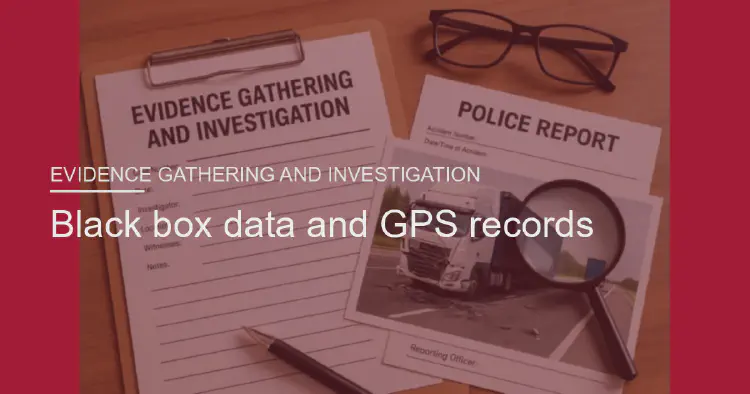Black box data and GPS records
Modern commercial trucks are equipped with electronic systems that record vital operational data. Known as 'black boxes' or Event Data Recorders (EDRs), along with GPS trackers, these devices provide crucial insights into what happened before and during a crash.
- Truck Accident Law Team
- 2 min read
Article 4 of 6 in Evidence Gathering and Investigation/

Black Box Data and GPS Records in Truck Accident Cases
What Is Black Box Data?
- Also called an Event Data Recorder (EDR) or Electronic Control Module (ECM).
- Captures detailed information about the truck’s operation in the moments leading up to and during a collision.
Information Typically Captured
- Vehicle speed.
- Brake application and timing.
- Engine RPM and throttle position.
- Seatbelt usage.
- Sudden acceleration or deceleration.
- Crash impact force.
Role of GPS Records
- Track the location, route, and speed history of a truck.
- Provide time-stamped movement data that can confirm or challenge driver logbooks and ELDs.
- Useful for reconstructing whether a driver followed lawful routes or detoured unsafely.
Legal Significance
-
Accident Reconstruction
- Helps experts recreate the sequence of events.
- Determines whether speeding, harsh braking, or mechanical issues contributed.
-
Proof of Negligence
- Confirms violations of speed limits, HOS rules, or reckless driving.
- Can contradict driver testimony if accounts differ.
-
Corroborating Other Evidence
- Aligns with police reports, eyewitness testimony, and physical damage evidence.
Preservation of Data
- Trucking companies often control access to black box and GPS records.
- Attorneys typically send spoliation letters to prevent data deletion.
- Courts may impose sanctions if evidence is destroyed or withheld.
Limitations
- Data retrieval requires specialized tools and experts.
- Some older trucks may have limited or no black box functionality.
- Defense may argue mechanical malfunctions in recording devices.
Summary: Black box data and GPS records provide objective, time-stamped insights into truck operations before and during crashes. They are powerful tools in proving negligence, supporting accident reconstruction, and holding responsible parties accountable in litigation.
You might also like:
- Tags:
- Trucking Companies
- Black Box
- Box Data
- Police Reports
- Accident Reconstruction
- Legal Significance
- Gps Records
- Eyewitness Testimony
- Hos Rules
- Speed Limits
- Data Gps
- Responsible Parties
- Reckless Driving
- Evidence Preservation
- Provide Objective
- Black Box Data
- Box Data Gps
- Data Gps Records
- Powerful Tools Proving
- Police Reports Eyewitness
- Mechanical Issues Contributed
- Legal Significance Accident
- Access Black Box
- Records Provide Objective